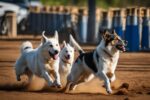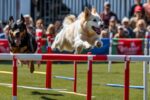Training Your Puppy to Defecate Outside the House: A Step-by-Step Guide
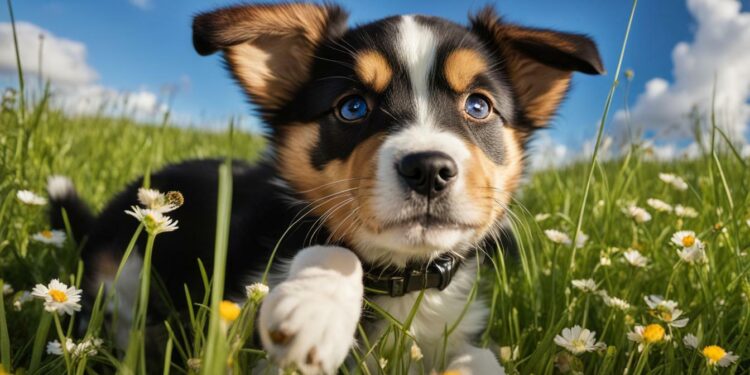
Are you tired of constantly cleaning up your puppy’s messes inside your home? Training your puppy to defecate outside the house is an essential part of promoting cleanliness and hygiene in your living environment. However, it can be a challenging task if you don’t know where to begin. In this step-by-step guide, we will provide you with practical tips and techniques to help train your puppy to defecate outdoors.
From establishing a routine for outdoor toileting to positive reinforcement training techniques, we’ve got you covered. We’ll also discuss common setbacks and troubleshooting strategies for long-term success. Whether you’re a new puppy owner or looking to retrain your pet, this guide will provide you with the tools you need to help your puppy develop proper bathroom habits.
Follow along as we explore the benefits of outdoor defecation and how to choose the right outdoor restroom area for your puppy. We’ll also cover important safety and health considerations and eco-friendly practices for outdoor defecation. With consistency and patience, you can help your puppy master the art of defecating outside the house and enjoy a clean and healthy living space.
Understanding the Importance of Outdoor Defecation
Training your puppy to defecate outside the house is an essential part of their development and promotes a clean and hygienic living environment. Having your puppy poop outdoors not only helps to maintain a healthy and sanitary home, but it also encourages them to develop good bathroom habits and reduces the risk of smelly accidents inside the house.
Allowing your puppy to defecate outdoors provides them with the opportunity to experience and explore different environments, which is also beneficial for their mental and physical well-being. Spending time outside helps to burn off excess energy, improve digestion, and can even reduce stress and anxiety in your pet.
Moreover, having your puppy defecate outside the house can save you time and effort on cleanup and maintenance, making it a more practical and efficient bathroom alternative. With a bit of patience and effort, you can easily train your puppy to adopt outdoor defecation as a regular habit that benefits both them and you.
Establishing a Routine for Outdoor Toileting
Establishing a routine for outdoor toileting is a crucial step in training your puppy to defecate outside the house. By following a consistent schedule, you can help your puppy develop good habits and reinforce desirable behaviors.
When creating a routine, it’s essential to consider your puppy’s natural patterns and needs. Puppies typically need to relieve themselves after waking up, after eating, and after playtime. Keep in mind that younger puppies may need more frequent trips outside, as they have smaller bladders.
To establish a routine, take your puppy outside on a leash to the designated bathroom area at regular intervals throughout the day. Start with every two hours and gradually increase the time between trips as your puppy learns to hold their bladder for longer periods.
It’s also important to be consistent with the time of day you take your puppy outside, as this helps their body develop a predictable schedule. Be patient with your puppy and give them time to adjust to the routine. Consistency is key to success in training your puppy to defecate outside the house.
Outdoor defecation methods play a crucial role in establishing a routine. Avoid changing the designated bathroom area, as this can confuse your puppy and lead to accidents. Creating a comfortable and accessible space in your backyard can make the process easier for your puppy and help them feel at ease. Be prepared for any weather conditions, as your puppy will need to go outside regardless of the temperature or precipitation.
Choosing the Right Outdoor Restroom Area
When it comes to choosing the right outdoor restroom area for your puppy, there are several factors to consider. It’s important to select a spot that is easily accessible for your pet and that will not be obstructed by obstacles or other distractions.
One option is to designate a specific area of your backyard as your puppy’s bathroom spot. This can help them associate the location with bathroom breaks and promote consistency in their toileting habits. You can mark the area with a specific scent or object to help your puppy identify it.
Another consideration is the surface type. Ideally, the area should be covered with grass or another natural material. This can help absorb any odor and provide a comfortable surface for your puppy to defecate on. Avoid using hard or rough surfaces, which can be uncomfortable and cause injury to your pet’s paw pads.
It’s also important to consider the cleanliness of the area. Make sure to pick up any waste promptly and use gentle cleaning solutions to disinfect the space. This can help prevent the spread of bacteria and parasites that can be harmful to your puppy’s health.
Overall, a suitable outdoor restroom area should be easily accessible, comfortable, and clean. By selecting the right spot for your puppy to defecate, you can promote good hygiene and create a safe and healthy environment for your pet.
Positive Reinforcement Training Techniques
Training your puppy to defecate outside the house can be challenging, but positive reinforcement techniques can make it easier and more effective. Positive reinforcement involves rewarding your puppy for good behavior, rather than punishing them for bad behavior. This approach helps to build a strong bond between you and your puppy and promotes a happy and stress-free training experience.
Here are some positive reinforcement techniques for training your puppy to defecate outside the house:
- Reward-based training: Provide treats and praise when your puppy defecates in the designated outdoor area. This technique encourages your puppy to repeat the behavior and reinforces positive habits.
- Consistency: Use the same command or cue whenever you take your puppy outside to defecate. This consistency helps your puppy understand what is expected of them and reinforces good habits.
- Praise: Offer verbal praise and physical affection whenever your puppy successfully defecates outside. This positive reinforcement helps your puppy build confidence and reinforces good behavior.
- Patience: Be patient with your puppy and avoid punishing them for accidents. This approach may cause your puppy to become fearful or anxious, hindering their ability to learn and adapt.
Using positive reinforcement techniques can help to create a positive and enjoyable training experience for both you and your puppy. By consistently rewarding good behavior and avoiding punishment, you can encourage your puppy to develop good bathroom habits and defecate outside the house.
Supervising and Monitoring Bathroom Breaks
Supervision and monitoring during bathroom breaks are crucial components of successfully training your puppy to defecate outside the house. By observing your puppy’s behavior and providing guidance, you can reinforce good habits and promote a safe and controlled environment.
Leash training is an effective way to supervise your puppy during outdoor toileting. When you take your puppy outside, attach a leash to their collar, so they remain close to you and don’t wander off. This will also prevent them from running after other animals or getting into harmful substances.
As you supervise your puppy, observe their behavior for signs that they need to defecate. These might include sniffing around, circling, or squatting. When you notice these behaviors, guide your puppy to the designated outdoor restroom area and offer verbal cues to encourage defecation.
It’s important to remain patient during the monitoring process as your puppy may take some time to get into a routine. Praise and reward them when they successfully defecate outside and avoid punishing them for accidents. Positive reinforcement is a more effective training technique for puppies than punishment, which can be confusing and counterproductive.
Managing Accidents and Cleanup
Accidents are a natural part of the puppy training process, and it is important to handle them correctly to minimize any negative impact. If an accident occurs, it is crucial to clean it up promptly and effectively to avoid any lingering odors or stains.
To clean up after your puppy’s accident, begin by using paper towels or a towel to remove any solid waste. Next, apply an enzymatic cleaner to the area to break down any remaining organic material. Allow the cleaner to sit for the recommended amount of time before blotting it up with a towel. Avoid using harsh chemicals or cleaning products, as they may be harmful to your pet.
It is important to establish a routine for cleaning up after your puppy to promote consistency and maintain a hygienic living environment. Keep a designated cleaning kit on hand, including paper towels, an enzymatic cleaner, and gloves to protect your hands from bacteria.
Proper waste disposal is also crucial for maintaining a clean and eco-friendly outdoor area. Be sure to dispose of any waste in a responsible manner, such as using biodegradable bags or composting. You may also consider enrolling your pet in a waste removal service to ensure that your outdoor area remains clean and sanitary.
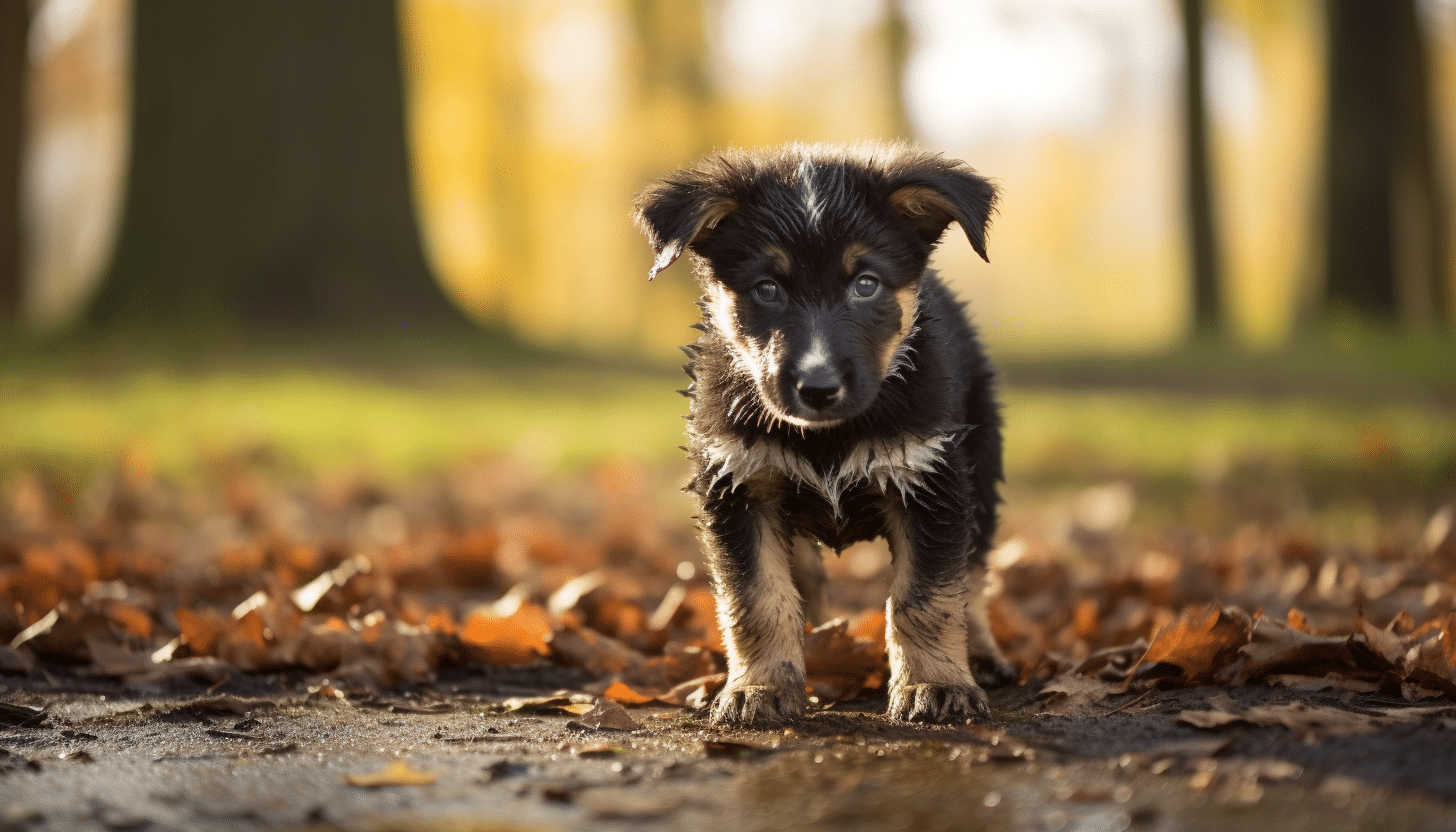
Introducing Verbal Cues and Commands
Verbal cues and commands are an essential aspect of training your puppy to defecate outside the house. By using consistent and clear verbal cues, you can communicate your expectations to your puppy and reinforce desired behaviors.
One effective approach is to use a short word or phrase that your puppy can associate with the act of defecating, such as “go potty” or “do your business.” Begin by using the verbal cue consistently during outdoor toileting until your puppy understands the association.
You can also use positive reinforcement to encourage the desired behavior. When your puppy successfully defecates outside, praise and reward them with treats or affection. This positive reinforcement will help your puppy connect the verbal cue with the desired behavior and motivate them to repeat it in the future.
It is important to use the same verbal cue consistently to avoid confusing your puppy and to reinforce the desired behavior. Additionally, avoid using negative or punishing language, as this can have the opposite effect and discourage your puppy from toileting outside.
By introducing verbal cues and commands in your puppy’s outdoor toileting routine, you can promote consistency and reinforce desired behavior through positive reinforcement training techniques.
Troubleshooting Common Challenges
Training your puppy to defecate outside the house can come with its fair share of challenges. Here are some common problems you may encounter, along with effective solutions:
Challenge: Inconsistent Behavior
One of the biggest challenges in puppy training is inconsistency. Your puppy may have good days where they follow your commands, followed by bad days where they seem to ignore everything you say. This can be frustrating, but it’s important to stay patient and consistent in your training approach.
Solution: If your puppy shows inconsistent behavior, it’s best to start with the basics. Return to the fundamentals of positive reinforcement training, and ensure you are giving clear and consistent signals to your pet. Avoid punishing your puppy for mistakes, as this can cause confusion and anxiety.
Challenge: Refusal to Go Outside
Some puppies may be reluctant to go outside for bathroom breaks, which can be a major roadblock in your training efforts. This may be due to fear or discomfort in their outdoor surroundings.
Solution: Gradually acclimate your puppy to the outdoors by introducing them to new sights and smells in a controlled manner. Use positive reinforcement techniques to encourage your puppy to venture outside, and provide plenty of praise and rewards for successful trips to the bathroom.
Challenge: Accidents Indoors
Even with the best training efforts, accidents can still happen indoors. This can be frustrating, but it’s important to handle these situations calmly and efficiently.
Solution: When an indoor accident occurs, clean up the mess immediately using eco-friendly waste disposal methods, such as biodegradable bags. Avoid scolding or punishing your puppy, as this can create a negative association with bathroom behavior. Instead, refocus your training efforts on reinforcing positive behaviors outdoors.
Challenge: Distractions Outdoors
Outdoor environments can be full of distractions, from other animals to passing cars. These distractions may distract your puppy from their bathroom duties and make it difficult to maintain focus.
Solution: When taking your puppy outside for bathroom breaks, choose a quiet and secluded area away from distractions. Use verbal cues and positive reinforcement techniques to encourage your puppy to stay on task, and gradually increase the level of distractions as your pet becomes more comfortable with outdoor toileting.
Challenge: Health Issues
Health issues can also be a challenge in outdoor toileting. Puppies may be at risk for parasites, infections, and other health concerns associated with outdoor environments.
Solution: Ensure your puppy is up-to-date on all necessary vaccinations, and work closely with your vet to prevent and manage health issues. Use preventative measures such as flea and tick treatments, and always clean up waste promptly to minimize exposure to parasites and other harmful bacteria.
Successfully training your puppy to defecate outside the house requires patience, consistency, and a willingness to adapt to changing circumstances. With these troubleshooting strategies, you can overcome common challenges and ensure a positive outdoor toileting experience for you and your pet.
Outdoor Toileting in Different Environments
Teaching your puppy to defecate outside the house is not only beneficial for your living space but also crucial for traveling and adapting to different environments. Consistency is key when it comes to outdoor toileting. Gradually introducing new settings and maintaining the same routine can help your puppy adapt to different environments smoothly.
Start by choosing a spot in the new environment that is similar to your usual backyard toileting area. Take your puppy to that spot at regular intervals, following the same schedule as at home. Make sure to supervise and monitor them closely, providing positive reinforcement for desired behavior.
If your puppy struggles to adjust to a new environment, consider bringing a piece of their blanket or a familiar toy to provide comfort. Consistency and patience are crucial during this process.
It’s also important to clean up after your puppy and dispose of waste properly, even when in a new environment. Bring eco-friendly waste disposal bags and follow sanitation practices to avoid environmental damage and maintain hygiene.
Maintaining Consistency and Long-Term Success
Consistency is key to successful puppy training. The more consistent you are with your routines and commands, the faster your puppy will learn good habits. It’s important to establish a routine and stick to it, even on weekends and holidays. This consistency will help your puppy understand what is expected of them and prevent confusion or frustration.
Another way to maintain consistency is by using positive reinforcement techniques consistently. Whether it’s a treat, praise, or a favorite toy, it’s important to provide positive feedback every time your puppy defecates outside. This consistency will reinforce their good behavior and encourage them to continue their outdoor toileting habits.
However, setbacks may occur during the outdoor toileting training process. Don’t get discouraged! It’s normal for puppies to have accidents or setbacks, especially during the initial stages of training. When this happens, it’s important to assess the situation and identify what caused the problem. Then, adjust your training approach accordingly and try again.
Long-term success in outdoor toileting requires patience and perseverance. It’s essential to maintain consistency in your training techniques and routines until your puppy has developed good habits. Continually reinforce good behavior with positive rewards to help your pet maintain their outdoor toileting habits throughout their life.
Safety and Health Considerations
While training your puppy to defecate outside the house, it is important to keep their safety and health in mind. Here are some tips to ensure your puppy’s well-being during outdoor toileting.
Vaccinations
Ensure that your puppy is up-to-date on all necessary vaccinations, including those for diseases that can be transmitted through feces, such as parvo and distemper. Consult your veterinarian for a vaccination schedule and any additional recommendations for your specific location and lifestyle.
Parasite Prevention
Parasites such as worms and ticks can pose a health risk to your pup and should be prevented through regular medication and checkups. Keep your puppy’s outdoor toileting areas clean by promptly picking up and disposing of feces, and avoid areas with standing water or high grass where parasites may thrive.
Outdoor Hazards
Be aware of potential hazards in your puppy’s outdoor toileting areas, such as poisonous plants, sharp objects, and other animals. Supervise your puppy during bathroom breaks to prevent them from getting into harm’s way.
Hygiene
Proper hygiene practices are crucial for your puppy’s health. Wash your hands thoroughly after handling feces and regularly clean your puppy’s bedding and outdoor toileting areas with disinfectant to minimize the risk of infection or illness.
Water and Food
Ensure your puppy has access to clean water and food throughout the day, as dehydration and hunger can lead to health issues. Avoid feeding your puppy close to their outdoor toileting area to promote hygiene and discourage them from eliminating in that area.
Eco-Friendly Practices for Outdoor Defecation
As responsible pet owners, it’s essential to consider the environmental impact of our pets’ waste. Here are some eco-friendly practices to incorporate into your outdoor defecation routine:
Eco-Friendly Waste Disposal
Instead of using plastic bags to dispose of your puppy’s waste, consider using biodegradable options. Biodegradable bags break down much faster than regular plastic bags, reducing their impact on the environment. You could also explore composting options if you have a backyard or garden, where you can turn the waste into fertilizer for your plants.
Sanitation Practices
It’s crucial to maintain good sanitation practices to prevent the spread of disease and protect the environment. Always carry cleaning supplies with you when walking your puppy and promptly clean up any waste. Consider using eco-friendly cleaning solutions or making your own using natural ingredients like vinegar and baking soda.
Regularly wash your hands and use disinfectants on surfaces where your puppy has defecated to prevent the spread of bacteria and parasites. Dispose of cleaning materials and gloves responsibly, following your local waste disposal guidelines.
By incorporating eco-friendly practices into your outdoor defecation routine, you can promote cleanliness and protect the environment while ensuring your puppy’s hygiene. Remember that every small effort can make a big difference!
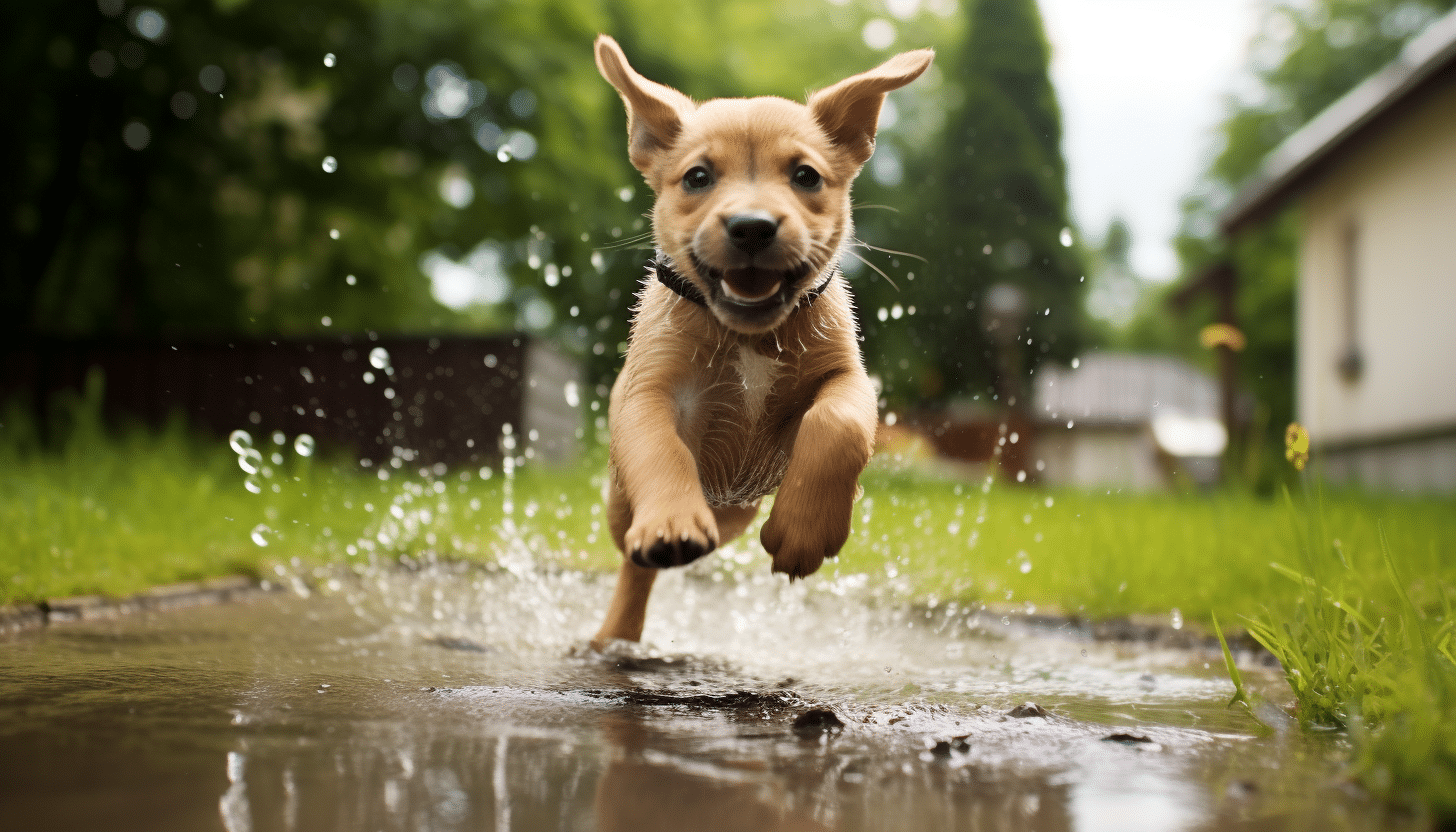
Conclusion – Defecate Outside the House
Training your puppy to defecate outside the house is an essential step towards promoting cleanliness and hygiene in your home. By following the step-by-step guide provided in this article, you can establish a routine for outdoor toileting, choose the right restroom area, and employ positive reinforcement training techniques to encourage desired behavior.
It is crucial to supervise and monitor your puppy during bathroom breaks, manage accidents and cleanup using eco-friendly waste disposal options, and introduce verbal cues and commands to aid in training. Troubleshooting common challenges and ensuring adaptability to different environments are also essential for long-term success.
While training your puppy to defecate outside the house, it is vital to consider safety and health considerations, such as vaccinations and parasite prevention. Additionally, eco-friendly practices, such as proper waste disposal, can minimize environmental impact while promoting cleanliness.
In conclusion, training your puppy to defecate outside the house is a vital step towards maintaining a clean and hygienic living environment. By following the tips and techniques provided in this article, you can successfully train your puppy and promote healthy habits that will benefit both your home and your pet’s overall well-being.
FAQ – Defecate Outside the House
Q: Can I train my puppy to defecate outside the house?
A: Yes, you can train your puppy to defecate outside the house. With patience, consistency, and positive reinforcement, you can teach your puppy proper bathroom habits.
Q: What are the benefits of outdoor defecation for my puppy?
A: Outdoor defecation helps maintain a clean and hygienic living environment. It also allows your puppy to explore and exercise outdoors, promoting their overall well-being.
Q: How do I establish a routine for outdoor toileting?
A: To establish a routine for outdoor toileting, observe your puppy’s natural patterns and create a consistent schedule. Take them to the designated outdoor area at regular intervals, especially after meals and napping.
Q: How do I choose the right outdoor restroom area for my puppy?
A: When choosing the right outdoor restroom area, consider selecting a spot in your backyard that is easily accessible and comfortable for your puppy. Ensure it is away from high-traffic areas and provide suitable surfaces for them to use.
Q: What are positive reinforcement training techniques for outdoor defecation?
A: Positive reinforcement techniques involve rewarding your puppy with treats, praise, and affection when they defecate outside. Consistency in using positive reinforcement can help reinforce the desired behavior.
Q: Why is supervising and monitoring bathroom breaks important?
A: Supervising and monitoring your puppy during bathroom breaks allows you to observe their behavior for cues and ensure they are safe. It also helps in establishing a routine and preventing accidents inside the house.
Q: How do I manage accidents and cleanup after my puppy?
A: In case of accidents, clean up promptly using pet-friendly cleaning solutions. Consider eco-friendly waste disposal options and take steps to minimize odors and maintain cleanliness in your home.
Q: How can I introduce verbal cues and commands for outdoor toileting?
A: Introduce specific verbal cues and commands, such as “go potty” or “do your business,” consistently while your puppy is defecating outside. Eventually, they will associate these cues with the desired behavior.
Q: What should I do if I face challenges during the training process?
A: If you face challenges during the training process, remain patient and persistent. Troubleshoot the specific issues and seek guidance from professional trainers if needed.
Q: Can my puppy adjust to outdoor toileting in different environments?
A: Yes, with gradual introduction and consistency, your puppy can learn to adapt to outdoor toileting in different environments. Practice the same routine and cues even when traveling or visiting unfamiliar places.
Q: How can I ensure consistency and long-term success in outdoor defecation?
A: To ensure consistency and long-term success, reinforce good habits through positive reinforcement, maintain a consistent routine, and address setbacks promptly. Consistency is key to reinforcing the desired behavior.
Q: Are there any safety and health considerations for outdoor toileting?
A: Safety and health considerations for outdoor toileting include keeping your puppy up to date on vaccinations and implementing parasite prevention measures. Regular veterinary check-ups are also important to ensure your puppy’s well-being.
Q: What are some eco-friendly practices for outdoor defecation?
A: Practice proper waste disposal by using biodegradable bags and disposing of waste in designated areas. Minimize environmental impact by choosing eco-friendly sanitation practices.

